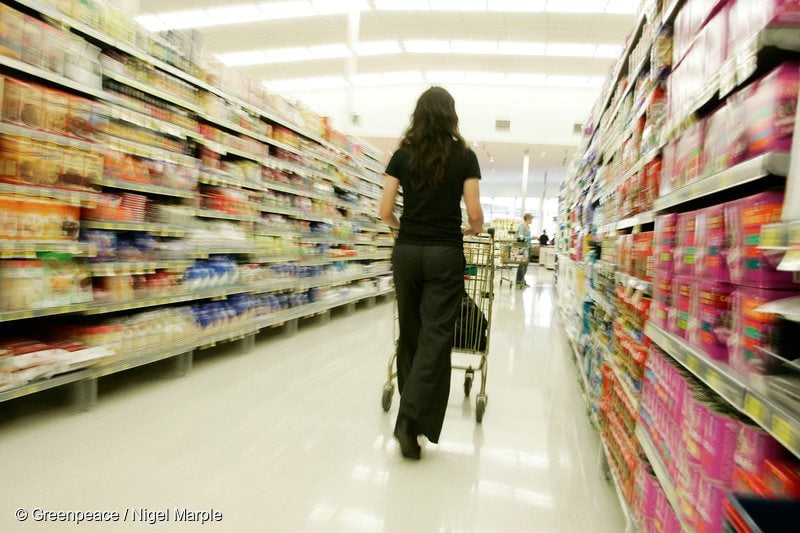As consumers, our choices matter—especially for the health of our oceans and the workers who bring seafood to our plates.
The U.S. is one of the world's largest consumers of seafood, and the largest market for canned tuna. This means our supermarkets—where we buy about half of our seafood—are one of the strongest connections to our oceans.
The Oceans Need Our Help
Overfishing and destructive fishing practices have caused the populations of the ocean's top predators—like sharks, tuna, and swordfish—to drop by as much as 90 percent over the past 50 years. Bycatch—where unintended victims like dolphins, sharks, and sea turtles are caught in the process of fishing and thrown back into the sea dead or dying—remains a scandalous problem.
But this isn't about forcing consumers to make tough choices. It's about companies and supermarkets making necessary changes so that sustainable seafood is readily available for shoppers.
That's why we're telling the companies and supermarkets that make billions off the demise of our oceans to change their practices and offer you more sustainable, socially responsible seafood. In order to ensure the future of marine life in our oceans, we need to stop destructive fishing practices, while supporting conservation efforts like marine reserves.
Slavery and Human Rights Abuses in the Seafood Industry
As fish stocks decline, industrial fishing operations expand, and demand increases for cheap seafood, companies are increasingly motivated to employ cheap or forced labor and to fish illegally.
Shocking human rights abuses have often been linked to illegal fishing, including human trafficking, violence against workers, and even murder. Given that more than 70 percent of the seafood consumed in the U.S. is imported, these abuses could be present in the supply chain that provides meals for people across America every day.
The burden is on major seafood buyers—like supermarkets—to confront these problems. While some companies are starting to take action, there's much more work to do.
Every single store must ensure its seafood is not associated with slavery or human rights abuses. All supermarkets share responsibility, but massive retailers like Walmart, Kroger, Costco, Albertsons-Safeway, and Publix must take the lead in addressing this problem.
Customers can take action by calling on their grocers to only purchase from companies that ensure safe, fair and equitable treatment of their workers.
Ocean-Safe Tuna
Tuna is one of the world's favorite fish and a staple in many U.S. households. Unfortunately, most of the tuna found on supermarket shelves—including well-known brands like Bumble Bee, Chicken of the Sea and Starkist—come from destructive fishing methods that injure and kill other marine animals.
Globally, tuna stocks are under serious threat. If the industry doesn't change its ways soon, our appetite for tuna will push these incredible creatures closer to extinction.
That's why getting supermarkets and big tuna brands to switch to sustainable tuna is a critical first step to protecting all marine life. Already, several progressive retailers are offering sustainably caught and affordable canned tuna options. Here's a hint: look for “pole-and-line” or “FAD-free” on the label.
However, there's still a long way to go to improve the sustainability of seafood sold in the U.S. and around the world. That's why as consumers, our choices matter—to supermarkets and to our oceans.
Protect the Bering Sea Canyons
The Bering Sea is the source of more than half the seafood caught in the United States. Spanning from western Alaska to Russia's Siberian coast, these waters support indigenous communities, marine mammals and birds, and small-boat fishers.
The Bering Sea is also home to the world's largest underwater canyons, Zhemchug and Pribilof. Sadly, their fragile coral and sponge habitat—essential for fish and other marine life—is being ravaged by industrial fishing.
Supermarkets play a key role in ensuring that the Bering Sea is able to continue providing much of America's seafood. Many have heeded the call to protect the Bering Sea Canyons, including major companies like Costco, Safeway, Whole Foods, Wegmans and Trader Joe's. But the future of the canyons remains uncertain.
Customers can encourage their grocers to support vital protections in these areas, and in turn, supermarkets must voice their support with the governing body that can grant these protections, the North Pacific Fishery Management Council.




